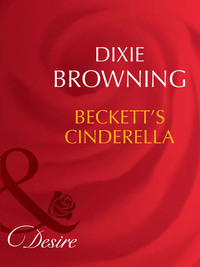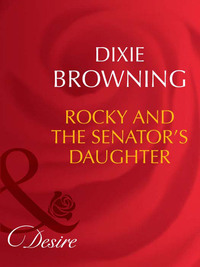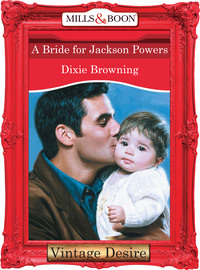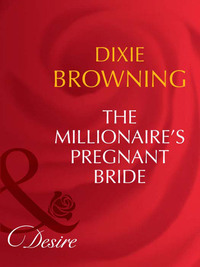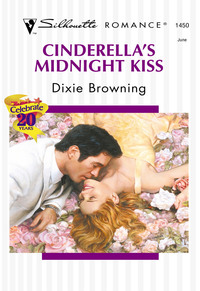
Полная версия
Beckett's Convenient Bride

Smoke, Clean Male Sweat And Red Hot Peppers. Bottle It, And You’d Have The World’s Most Effective Aphrodisiac.
He stood, stretched and massaged his temples. Quickly, before she could blurt out anything embarrassing, she turned and folded down the covers. Kicking her shoes aside, she climbed into bed and pulled the covers up around her ears. If she pretended to be asleep when he came back, she might be able to stay out of trouble.
His shirt was off before he closed the bathroom door behind him, revealing a tanned, wedge-shaped back with a few intriguing scars, which she did her best to ignore. Yawning, she closed her eyes and tried to focus on recreating the story of Gretchen’s Ghost from the first line.
It was a lost cause. The picture that emerged on her mental screen resembled an X-rated video—one that left her feeling flushed and restless….
Dear Reader,
Get your new year off to a sizzling start by reading six passionate, powerful and provocative new love stories from Silhouette Desire!
Don’t miss the exciting launch of DYNASTIES: THE BARONES, the new 12-book continuity series about feuding Italian-American families caught in a web of danger, deceit and desire. Meet Nicholas, the eldest son of Boston’s powerful Barone clan, and Gail, the down-to-earth nanny who wins his heart, in The Playboy & Plain Jane (#1483) by USA TODAY bestselling author Leanne Banks.
In Beckett’s Convenient Bride (#1484), the final story in Dixie Browning’s BECKETT’S FORTUNE miniseries, a detective offers the protection of his home—and loses his heart—to a waitress whose own home is torched after she witnesses a murder. And in The Sheikh’s Bidding (#1485) by Kristi Gold, an Arabian prince pays dearly to win back his ex-lover and their son.
Reader favorite Sara Orwig completes her STALLION PASS miniseries with The Rancher, the Baby & the Nanny (#1486), featuring a daredevil cowboy and the shy miss he hires to care for his baby niece. In Quade: The Irresistible One (#1487) by Bronwyn Jameson, sparks fly when two lawyers exchange more than arguments. And great news for all you fans of Harlequin Historicals author Charlene Sands—she’s now writing contemporary romances, as well, and debuts in Desire with The Heart of a Cowboy (#1488), a reunion romance that puts an ex-rodeo star at close quarters on a ranch with the pregnant widow he’s loved silently for years.
Ring in this new year with all six brand-new love stories from Silhouette Desire….
Enjoy!

Joan Marlow Golan
Senior Editor, Silhouette Desire
Beckett’s Convenient Bride
Dixie Browning

MILLS & BOON
Before you start reading, why not sign up?
Thank you for downloading this Mills & Boon book. If you want to hear about exclusive discounts, special offers and competitions, sign up to our email newsletter today!
SIGN ME UP!
Or simply visit
signup.millsandboon.co.uk
Mills & Boon emails are completely free to receive and you can unsubscribe at any time via the link in any email we send you.
DIXIE BROWNING
is an award-winning painter and writer, mother and grandmother. Her father was a big-league baseball player, her grandfather a sea captain. In addition to her nearly eighty contemporary romances, Dixie and her sister, Mary Williams, have written more than a dozen historical romances under the name Bronwyn Williams. Contact Dixie at www.dixiebrowning.com, or at P.O. Box 1389, Buxton, NC 27920.
Contents
Chapter One
Chapter Two
Chapter Three
Chapter Four
Chapter Five
Chapter Six
Chapter Seven
Chapter Eight
Chapter Nine
Chapter Ten
Chapter Eleven
Chapter Twelve
Chapter Thirteen
Epilogue
One
Leaning forward, Carson Beckett removed the weights from his ankles and flopped back onto the exercise mat, exhausted and depressed. It was taking too long to regain his strength this time. And hell, he was still in his prime. Chronologically, at least. He knew of guys who reached retirement without ever having suffered so much as a hangnail. Not many, but a few. At the rate he was going, about all he’d be fit for was dusting a desk chair with the seat of his pants.
The occasional patch-up job was to be expected; he was a cop, after all. But a concussion, a black eye, a total of eleven broken bones counting arms, legs, fingers and ribs, all within the space of less than three years? That was pushing it.
At this rate he might even reconsider taking up that offer of a teaching post at the university. According to Margaret, the woman he was planning to marry as soon as he was up and running again, a degree in criminology was wasted on a policeman.
Carson poured himself a glass of water. Tap water, not the other stuff. Better the enemy you know, as he always told Margaret, who was never without her bottle of designer water. “Do you know where that water’s been?” he would tease.
Nine times out of ten she would frown and glance at the label. The lady had a lot going for her—looks, talent, ambition—but her sense of humor was notoriously deficient.
All the same, Car told himself as he stretched and flexed his lean six-foot-two body, it was time to toe up to the marriage mark. Neither of them was getting any younger. Margaret was a year and a half older than he was, but looked five years younger. She’d made it plain that children were not an option, as she had her career to consider, but then, his mother would be happy enough to see them married. She would go on hoping for a grandchild as long as she was capable of hoping for anything, but after awhile…
In the bathroom that had been added on after he’d bought the old shotgun-style house outside Charleston, Carson peeled off his sodden sweats and stepped under the shower, flinching as he adjusted the head for nail-driver pressure. Nothing like a hard stream of cold water pounding down on his scalp to jump-start the brain.
It was several minutes before he realized that not all the pounding was water. Someone was at his front door.
Wrapping a towel around his waist, he barefooted it down the hallway and opened the door a crack, expecting the pizza he’d ordered earlier. He’d been practically living on the stuff for weeks.
“Hey, man, I was about to give up on you. Got a message from the chief.” The voice was hoarse, the face familiar.
Shivering as the rain-laden March wind streaked past him into the house, Carson stepped back and let his friend and partner inside. “You look like hell, Mac.”
“Look who’s talking,” the younger man croaked.
“Come on in, there’s still some coffee in the pot.” The two men had joined the force the same year and had worked together on numerous cases, sharing too much stress and bad coffee.
The stocky, redheaded policeman flung the rain off his hat and ducked inside. He opened his mouth to speak and sneezed instead. “Jesus, Car, I’m sorry.”
“Bless you. Sounds like you need something stronger than coffee.”
“Can’t. On duty.” Mac McGinty dragged forth a soggy handkerchief and blew his red nose. “What I came for, Chief says you might as well stay out another week.” Carson had been out for the past three weeks on disability. “Everybody’s got this flu thing, or whatever it is. Miserable stuff. Makes you feel like you been kicked all over.”
The cop looked down at the fresh scars visible under the towel on his buddy’s bare legs, and swore. “Yeah, well…like I’m saying, you come back now, you’ll be laid up another month.”
“Didn’t you take your shot last fall?”
“You know me and needles. I figured if all the rest of you guys got shots, there wouldn’t be nobody for me to catch it from.”
Carson shook his head. “Tell me something, man—how’d you ever pass the physical? When they X-rayed your skull, didn’t it register empty?”
“Yeah, yeah, yeah, so I sneezed on you. All I’ve got is a cold. It’s those other jokers you got to watch out for. I mean, Eddie, he’s been out since last Thursday, running a fever, coughing his head off.” The redheaded policeman forked back his hair, replaced his hat and reached for the door.
“Sounds like I’m needed.”
“No way. Some of the first guys to go down are already starting to come back. Chief says your immunity system’s probably compromised or something.”
“Or something,” Carson Beckett said dryly, watching his friend dash out to the unmarked car.
Glancing at the relentlessly gray skies, he shut the door and turned toward the kitchen to see if he had any canned chicken soup on hand. Just in case. The pizza, when and if it was delivered, would do for breakfast.
As guilty as he might feel about being out on disability for so long, the chief was probably right. Whatever bug was going around, Carson couldn’t afford to risk it. He didn’t know about his immune system, but tangling with a drug dealer armed with a two-ton truck, followed a few months later by having his unmarked car creamed by a kid riding a chemical high was about all he could handle at one time. He was beginning to feel like that old Li’l Abner character—the guy with his own personal black cloud hanging over his head.
He missed work. Missed the boredom of routine calls and paperwork, the adrenaline rush of closing in on a tough case, and most of all, missed the camaraderie of guys he’d worked with for years, even those he didn’t particularly like.
It was his life, dammit. It was what he did—who he was.
He found a can of chicken noodle soup, opened it and dumped it into a pan. Adding garlic salt and black pepper, he debated his options. He could report in tomorrow and catch up on some of the paperwork that was part of being a cop these days.
Or he could use the rest of his downtime constructively. He had some pressing personal business he’d put off for too long, starting with Margaret.
It had always been more or less understood in both families—hers had lived next door for at least a generation—that unless something better came along for either of them, they would end up together. The Becketts were big on family. Strong ties, deep roots. Margaret was his mother’s goddaughter, and Kate, his mother, was increasingly fragile, in the early stages of Alzheimer’s. Both he and Margaret had agreed that they owed it to her to marry while she could still be a part of the festivities.
Carson had a habit that had developed into a policy over the years. On any to-do list of more than three items, he always tried to shorten the list by first tackling the one that could be finished the quickest.
Which meant that before he got caught up in wedding prep—in his family, marriage was a big deal—he needed to fulfill a promise he’d made to his grandfather before he died. A promise to clear up a generations-old debt owed by the Becketts to a family named Chandler.
Ever since a cowboy from Oklahoma named Chandler had handed over an undisclosed sum of money to an earlier Beckett, asked him to invest it, and then disappeared, the debt had gone unpaid. The Becketts had thrived. No one knew what had happened to the original Chandler, but a bundle of stock had been handed down through the Beckett family, with each subsequent generation intending to track down the Chandler heirs to make restitution.
Three days, tops, and the deed would be done. One more item he could mark off his list. Next would come formally popping the question and keeping his mother supplied with bridal magazines, fresh photo albums and blunt-tipped scissors. She was totally focused on weddings.
Barefooted, dressed in jeans and an open flannel shirt, Carson ate the soup from the pan. Table manners had been instilled in him from the time he was allowed to eat in the dining room with the family, but as a bachelor living alone, he allowed himself a certain amount of leeway.
He would have to clean up his act—one more thing on his to-do list—but not yet. It could wait until he was back on duty. Meanwhile, he would plan on one day to drive up to Nags Head, a day to locate the address and hand over the money, and another day to get back home. He could have made it in two days, but unless he got out and walked around every couple of hours, his knee and God knows what else would freeze up on him.
But the deed would be done. Finally. Unfortunately, the stock was now worthless, as the Becketts were inclined to procrastinate. The only record of the original debt was word-of-mouth, and PawPaw, who might have remembered hearing a few details from his own father, had died in January at age one hundred and two after suffering a series of strokes. For various reasons, neither of his sons was able to take on the task, and so it had been left to Carson and his cousin, Lance Beckett.
It was Lance who had come up with the idea of hiring a genealogist to track down the Chandler descendants. They’d shared the cost and each agreed to chip in ten grand of their own, intending to locate the heirs, hand over the money and mark the debt paid in full. It might not be enough; on the other hand, it might be a terrific return on what could easily have been the loan of fifty bucks, if you didn’t figure in compound interest. Back in the late 1800s when the debt had initially been incurred, fifty bucks might have been considered respectable money.
Lance had already fulfilled his part of the promise by tracking down one of the two heirs and repaying his portion of the debt. He’d gone further than that—he’d married the woman.
Now it was Carson’s turn. Unlike Lance’s heiress, who had moved east from Texas, Carson’s heiress had originated in Virginia, daughter of a high profile trial lawyer named Christopher Dixon and one Elizabeth Chandler Dixon, both deceased; granddaughter of a retired judge known as old Cast Iron Dixon and a wealthy socialite with the unusual name of Flavia. Both maternal grandparents deceased.
The Chandlers were thinning out, it seemed.
“Well, thank the Lord for small mercies,” Kit Dixon muttered under her breath, screwing the cap back on her India Ink drawing pen. The two jerks who’d been arguing so loudly on the other side of the church had evidently decided to make peace—or at least to move their argument to more appropriate surroundings.
One of the reasons she liked this old cemetery so much was the peacefulness. It was little more than a wooded knoll in a sea of marsh grass, home only to countless birds and small animals.
Kit hated anger, hated arguments. Always had. Even after all these years, loud, angry voices still made her stomach ache.
As quiet once again descended over the surroundings, she leaned against a mossy tombstone and gazed out over the cypress trees, the wind-twisted scrub oaks and a cluster of cedars. Chalky white marble gravestones of all shapes and sizes stood out against the dark foliage. Small ones with lambs on top—tall ones with angels. The lambs were her favorites.
It was perfect. She could easily visualize ghosts rising like smoke from the ancient graves. Now that the last sketch was done, she was ready to bring her watercolors. Atmosphere was far more important than getting a perfect drawing. During that fleeting time before nightfall she could sweep in the values and the muted colors—fifteen or twenty minutes for each illustration, and she’d be finished. After that she’d give the manuscript one last polish, hand it over to be typed, and Gretchen’s Ghost would be finished. It wasn’t even due at her publisher until the first of April.
Brushing the leaves and dried grass from her seat, Kit paused to touch a leaning marker, worn far too smooth to read. “Who are you?” she wondered aloud. “If I knew your name, I’d use it in my next story.”
She often used names she found on tombstones or on mailboxes, mixing first names and last. It gave her a sense of being connected to the past. And although she hated to admit it, she desperately needed to feel connected to someone—to something solid. She wondered sometimes if everyone felt that way, especially as they grew older.
But then, most people she knew had someone, somewhere.
Kit had someone. She had her paternal grandparents. She would probably even put in an appearance at their fiftieth anniversary party. She made a habit of dropping in unannounced every few months, partly out of a sense of duty, but mostly because it irritated her grandfather so. She would stay for half an hour and then leave. Leaving was the best part of all, because she could.
And because she knew it drove her grandfather wild. It wasn’t his granddaughter he wanted, it was what she represented—the last link with his only son. And she ought to feel sorry for him, she really should, only she couldn’t. She knew him too well.
So maybe she’d skip the party and get herself a dog.
Maybe she’d get a dog and take it to the party.
Or maybe she’d invite Keefer, the surf-bum she’d shared a house with last summer. It would serve him right. Her grandfather, not Keefer, who wouldn’t have been impressed if she’d told him she was a royal princess. Three things impressed Keefer. Good grass, big surf and big bazongas.
Kit didn’t have big bazongas. She practically didn’t have any at all, not that it mattered. An author-illustrator of two published children’s books with another one almost finished, her first book, Claire the Loon, had been optioned for television. When she’d first been notified, she hadn’t believed it. When it had sunk in, she’d walked three feet off the ground for a week.
Of course nothing had come of it so far. Odds were, nothing ever would. She’d been told by her agent not to get her hopes up, as far more books were optioned than ever made the final cut, so other than treating herself to a mammogram, an eye exam and half a gallon of Tin Roof Sundae ice cream, she hadn’t spent a penny of the option advance. It was in the bank earning a pathetic rate of interest.
Her real bread and butter, not to mention her rent and her art supplies, came from waiting tables. It was the perfect job. In season, the tips were easily enough to live on, yet the hours allowed her plenty of time to write. As there were usually job openings all up and down the Outer Banks in season, she was able to pick up and move as often as she liked if she needed a fresh locale.
That was just one more thing her grandparents disapproved of. No permanent address. They called her lifestyle immature, among several less flattering things. Perhaps it was. More likely it was her own brand of claustrophobia. Whatever it was called, she had a deep-seated need to prove her independence, and for the last seven years she’d been doing just that.
Not the way her mother had, with alcohol and lovers. Her grandparents never failed to remind her of her mother’s twin weaknesses at every opportunity. Both, Kit was convinced, were a result of being married to a man who had all the warmth of an empty igloo. The irony was that Kit had just enough of her father in her—not his cruelty, but his steely determination—to defy her grandparents and build a life for herself. And although she felt justly proud of her small publishing accomplishments, there was no room in her pragmatic, hardworking, self-supporting lifestyle for artistic temperament.
Okay, so she enjoyed being able to dress any old way she pleased. So she liked old cemeteries. After working eight hours a day in a noisy restaurant, with clattering cutlery and people constantly making demands, she found old burial grounds restful.
Besides, it came under the heading of research. Both her published books had been ghost stories, involving pirates and shipwrecked sailors as well as children and animals. It was her thing. Her bag, as Keefer would say. Start with a quirky animal personality, throw in a large helping of local history and a dash of fantasy, and voilà. Gretchen’s Ghost was going to be her best yet.
After repacking her backpack, checking to see that she’d left nothing behind, Kit headed for the parking lot on the other side of the church. She had just reached the old wrought-iron gate when the stillness was rent by the sound of a single gunshot.
Startled, she froze and waited. A hunter? In March? At this time of evening? Wasn’t that illegal?
Besides, who would hunt in a place like this?
When she heard the sound of someone speeding away she let out the breath she’d been holding. That’s what it had been—an engine backfiring. That funny whining sound it had made when it was racing off probably meant it needed tuning.
Admittedly, one of the occupational hazards of being a writer of fiction, especially fiction that edged over into fantasy, was that a single backfire could instantly become a pirate landing or an invasion from another planet.
The church was used only for summer revival meetings, but the security light was still in service. Now the pink glow shone down on the graveled parking lot, empty except for Ladybug, her orange-and-black, hand-detailed VW. So much for the invasion from Mars, she thought ruefully as she dodged a patch of weeds.
She was nearly halfway to her car when she spotted what appeared to be either a shadow or an even larger clump of weeds.
Not a shadow. There was nothing nearby to cast such an oddly shaped shadow. And not weeds, either, it was too solid.
A trash bag? A big, injured dog? A deer?
Oh, no—someone had shot a deer!
Maybe the poor thing wasn’t dead—maybe the Fish and Wildlife people could…
After the first few steps she froze. Then, sick with dread, she crept closer. “Omigod, omigod, no, please,” she whispered, backing away.
It was an old man, and he was obviously dead. There was a black hole in the middle of his forehead and a dark trickle of something that looked like blood trailing down his cheek from his left nostril.
Kit’s snack of almonds and dried apricots threatened to turn on her. She swallowed hard and muttered, “Gotta get help, gotta get help!”
But where…? Who? Murder didn’t happen in a place like Gilbert’s Point, it just didn’t.
But it had. And suddenly she realized that whoever had done it had to have seen her car. There couldn’t be more than one like it in the entire county—maybe in the entire world.
She stared at the vanity plate she’d bought with part of her first advance: KITSKIDS. If anyone wanted to find her…
Edging around the still form lying on the weedy, badly graveled parking lot, she hurried to her car. Throwing her pack onto the other seat, she locked the doors, keyed the ignition and ground the starter.
Don’t panic.
Cell phone. Why the devil hadn’t she bought herself one of the pesky things and learned how to use it. Everyone knew how to use a cell phone.
Everyone but Kit.
But even if she’d had a phone, she didn’t know the sheriff’s number. Wasn’t there some automatic gizmo you could punch to get help in an emergency?
One of the reasons she didn’t own a cell phone or a computer or any of the other gadgets everyone else in the world took for granted was that she was no good with gadgets.
“Nine-one-one, you ninny!” Any child knew how to dial nine-one-one. Don’t panic, don’t panic.
She would go home and dial nine-one-one and tell whoever answered that there was a dead man out at the old church on Cypress Mill Road. And they would ask her name, and she would have to go in and testify, and her grandfather…
Oh, shoot.





